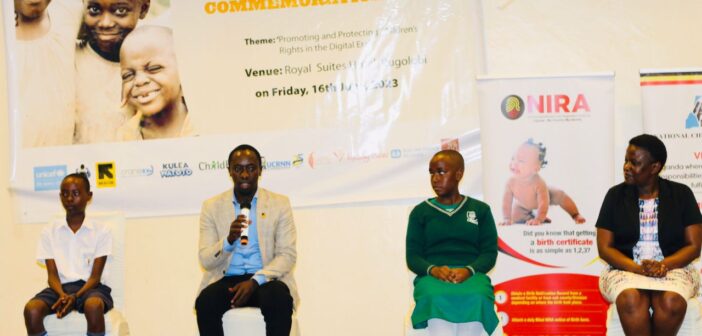By Peter Okwalinga
Kampala, Uganda – In commemoration of the Day of the African Child, the National Identification and Registration Authority (NIRA) joined forces with the Ministry of Gender, Labour, and Social Development to emphasize the importance of promoting and protecting children’s rights in the digital era. The event, held in Kampala, centered around this year’s theme, which highlights the critical need to safeguard children’s rights in the face of evolving technological challenges.
The Ministry of Gender, Labour, and Social Development, spearheading the efforts to create an enabling environment for children’s rights in Uganda, recognizes NIRA as one of the lead agencies in this endeavor.
Through the implementation of essential laws and policies, such as the Children’s Act, the national child policy, and The National Strategy to end child marriage and teenage pregnancies, the ministry strives to protect and promote the rights of children across the country.
In response to the unique challenges presented by the digital age, the Ugandan government has also enacted laws aimed at ensuring children’s safety. The Computer Misuse Act and the Anti-pornography Act of 2014 are significant legal measures in place to combat online offenses and protect children. To further enhance child protection, a dedicated toll-free number (116) operates 24/7, providing a platform for reporting all forms of child abuse.
The Day of the African Child, observed annually on June 16, brings together governments, NGOs, international organizations, and stakeholders to address the challenges and opportunities associated with realizing the full rights of children in Africa. The day holds particular significance as it commemorates the 16th June 1976 student uprising in Soweto, South Africa, when students protested against inadequate education and demanded instruction in their own languages.

UNICEF, a major advocate for child protection in Uganda, has played a vital role in supporting the interventions initiated by the Ministry of Gender, Labour, and Social Development. By strengthening national infrastructure, including law enforcement, criminal justice systems, and social care capacity, UNICEF enhances the country’s ability to combat online offenses effectively.
Mr. Diclerk Asiimwe, UNICEF’s Child Protection Specialist, emphasizes the importance of strengthening infrastructure as a necessary precursor to raising awareness and providing survivor support.
During a panel discussion, NIRA’s Executive Director, Ms. Rosemary Kisembo, urged pupils to become birth registration ambassadors within their respective homes.
Highlighting the significance of birth registration, Ms. Kisembo, emphasized that every child born in Uganda should be enrolled for a National Identification Number (NIN). According to the Registration of Persons Act, NIRA allocates a unique NIN to each registered child, ensuring their identification and providing a foundation for exercising their rights and seeking redress when necessary.
NIRA actively contributes to the promotion and protection of children’s rights by creating awareness about registration services and facilitating the registration of births and NIN allocations as mandated by law.
The organization implements inclusive measures to scale up birth registrations, including reaching out to schools, hospitals, and refugee with mobile registration units. In the same effort Ms. Arafha Akurut,the Senior Registration Officer in charge of Birth, death and Adoption Order registrations, highlighted recently, NIRA successfully conducted birth registrations for refugee children in West Nile and engaged with the SAUTI Recreation Center in Naguru as part of the institution’s intervention in fulfilling its mandate to register foundlings.
It is crucial to emphasize that birth registration is a fundamental human right, representing the official acknowledgment of a child’s existence, recognition of their name, and proof that they belong to a family and a nation.
The benefits of higher rates of civil registration extend beyond the individual; countries need to know how many people are born each year to safeguard individuals’ right, to establish a legal identity from birth, be protected from violence and exploitation, access social services, and secure inheritance among others.



